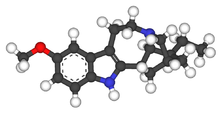Ibogaine
 |
|
 |
|
| Clinical data | |
|---|---|
| Routes of administration |
oral |
| ATC code | none |
| Legal status | |
| Legal status |
|
| Identifiers | |
|
|
| CAS Number |
83-74-9 |
| PubChem (CID) | 197060 |
| ChemSpider |
170667 |
| UNII |
3S814I130U |
| ChEMBL |
CHEMBL1215855 |
| ECHA InfoCard | 100.001.363 |
| Chemical and physical data | |
| Formula | C20H26N2O |
| Molar mass | 310.44 g·mol−1 |
| 3D model (Jmol) | Interactive image |
| Melting point | 152 to 153 °C (306 to 307 °F) |
|
|
|
|
Ibogaine is a naturally occurring psychoactive substance found in plants in the Apocynaceae family such as Tabernanthe iboga, Voacanga africana and Tabernaemontana undulata. It is a psychedelic with dissociative properties.
Ibogaine is not currently approved for any medical uses in the United States. Preliminary research indicates that it may help with drug addiction; however, there is a lack of data in humans. Its use has been associated with serious side effects and death. It is used as an alternative medicine treatment for drug addiction in some countries. Its prohibition in other countries has slowed scientific research. Ibogaine is also used to facilitate psychological introspection and spiritual exploration. Derivatives of ibogaine that lack the substance's psychedelic properties are under development.
Ibogaine-containing preparations are used for medicinal and ritual purposes within African spiritual traditions of the Bwiti, who claim to have learned it from the Pygmy peoples. Although it was first commonly advertised as having anti-addictive properties in 1962 by Howard Lotsof, its Western use predates that by at least a century. In France it was marketed as Lambarène and used as a stimulant. Additionally, the U.S. Central Intelligence Agency (CIA) studied the effects of ibogaine in the 1950s.
Ibogaine is an indole alkaloid that is obtained either by extraction from the iboga plant or by semi-synthesis from the precursor compound voacangine, another plant alkaloid. The total synthesis of ibogaine was described in 1956. Structural elucidation by X-ray crystallography was completed in 1960.
...
Wikipedia
